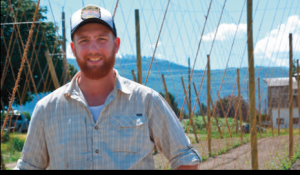Locals combine forces to make beer a truly Fraser Valley experience
Ronda Payne
The last high volume harvest of BC hops occurred close to 20 years ago. Hops production in the Fraser Valley effectively ended at that point and may have stayed dormant if it weren’t for the growth of craft brewing in the Pacific Northwest.
Terms like growler, microbrewery and beer tasting room became part of the lexicon in the region and forward-thinking farmers and beer enthusiasts alike saw opportunity. Small hops growers have popped up in various locations around the province, but it’s in Abbotsford, BC where big plans are brewing to support family farm land while making great local beer.
Paul Sweeting is the owner of newly-opened Ravens Brewing Company. Working from an unassuming, semi-industrial building at 2485 Townline Rd., Sweeting sees sourcing local product for unique beer tastes as a core value of the business.
Obviously his customers agree. They’ve come from Abbotsford, Coquitlam, Vancouver, Chilliwack, even Washington to try a taste of local.
“It’s been a lot of fun,” Sweeting said. “It’s a great experience on both sides of the coin. Working with farmers sourcing local ingredients and on the other side, our spent grain is going to local cattle and pigs.”
One of the local farmers working with Sweeting is Dwayne Stewart of Valley Hops. Stewart is passionate about helping families hang onto farm land while making it profitable.

“We’re working to help preserve family farms,” Stewart said. “[Our ideal growers] need more revenue than forage crops can give.”
According to Stewart, hops is a crop growing in popularity with high demand and isn’t facing a saturated market like some Fraser Valley grown crops. Plus, because Valley Hops is set up to provide the expertise needed by growers, Stewart and his team are able to get farms up and running quickly.
This is music to Sweeting’s ears.
He has a series of beers called Ground to Glass celebrating the journey of ingredients from the soil, through the brewing process and into his customer’s cup. At minimum, at least one ingredient in the Ground to Glass beers will be easily traced back to a local grower.
“The first release [of Ground to Glass] won’t be until August,” he noted.
But in the meantime, there has been plenty to enjoy at Ravens with local ingredients, like the Westcoast Pale Ale which uses hops grown by Stewart. The plan is to always use local hops in the Westcoast Pale Ale and if Stewart can make his vision a reality, it should be possible. It is more of a challenge than one might expect as Stewart noted craft beers use five times more hops than the traditional macro beers.
“The stuff we planted at Dwayne’s farm will be used in that beer,” Sweeting said.
Stewart sees developing farms as key because of the increasing price of hops coming in from the United States (and beyond) and the fluctuating dollar. Locally produced hops will provide stability to the local microbrewery industry along with the benefits of locally sourced product.
Making use of young, educated talent is also part of the plan with Ravens’ assistant brewer going through the new Kwantlen Polytechnic University’s brewing and brewery operations program. One of the program’s instructors, Nick Fengler, is Ravens’ head brewer.
On Stewart’s side, Samuel Glasgow, a graduate of the University of the Fraser Valley’s agriculture program is the farm manager. He manages the 10 acres currently planted. Stewart notes there are two other fields soon to come online with hops production.
“We’re connecting breweries with the land and are allowing breweries to become part of that farming experience,” Stewart said.
When that last commercial crops harvest happened in 1997, all the facilities for hops production went with it. Stewart is having to build everything from the ground up.
“The thing with hops is the processing,” he said.
The long-term, multi-year plan is to have 375 acres under production feeding two processing plants. So far all the fields are on the Sumas Prairies, but Stewart is working with farmers in Mount Lehman and Chilliwack as well.
“You’ve got to actually take it [the hops] to a level where a brewer like Ravens can use the product,” noted Stewart.
That means, after the harvest, the hops need to be dried and pelletized for use and this must be done with care. Stewart said easily 50 per cent of hops quality comes from the work that happens post-harvest.
Hops is not a registered crop in Canada and Stewart is hoping the growing value will soon be recognized to allow for approval of labelling for treatments like pesticides and herbicides along with governmental support.
“We’re literally having to restart everything about the crop,” he said.
To find out more about the hops industry in the Fraser Valley contact Stewart at sales@valleyhops.com.












